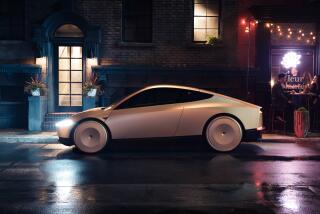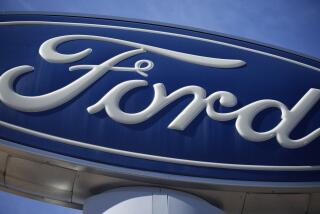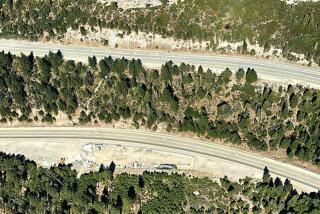Tesla’s entry into truck-making presents a whole new challenge for Elon Musk
Reporting from San Francisco — There’s a cool new electric semi truck coming around the bend.
It looks Space Age sleek: no gears, so no constant shifting. Recharging the battery is a lot cheaper than diesel fuel.
Finn Murphy, an independent truck owner-operator, can’t wait to try it out. “The cab is larger, the living area is larger,” he said. “It’s very exciting.”
The truck Murphy was describing? It’s the Nikola One, a fuel-cell electric truck from Nikola Motor in Salt Lake City that’s expected to hit highways in 2021.
Not the much-hyped Tesla semi that Chief Executive Elon Musk is set to unveil at an elaborate stage outside Los Angeles on Thursday night.
The event “will blow your mind clear out of your skull into an alternate dimension,” Musk tweeted recently. He discussed the truck, and displayed a shadowy photo, at a TED talk last April.
Musk could reveal some amazing technology breakthrough on Thursday, a partnership with a big truck maker or some other surprise. But while Tesla had the luxury electric car market to itself when it upended the auto industry with the Model S sedan in 2012, the company can’t yet claim to be a pioneer in electric semi trucks. It will enter the semi truck business with an array of competitors already hard at work.
Heavy-duty fuel-cell trucks built by Toyota are moving freight at the Port of Los Angeles. Cummins, the diesel engine maker, debuted a prototype electric-drive semi in August.
BYD, the China-based company with a big factory in Lancaster, is about to deliver its first drayage semi tractor, with six more by the end of the year, to pull containers around ports in Los Angeles, Long Beach and San Diego.
Daimler, the German motor vehicle giant best known for its Mercedes-Benz brand, already is making electric urban delivery trucks and plans to put the Vision One big rig on the market by 2022.
“Basically every [truck] manufacturer is developing battery, fuel-cell electric or hybrids,” said Andrew Swanton, vice president for truck sales at BYD Motors North America. “Peterbilt, Kenworth, Volvo.”
A slew of electric semi start-ups includes Wrightspeed, run by Tesla co-founder Ian Wright, which retrofits standard truck frames with its own extended-range hybrid electric drive system; Proterra, an electric bus builder in City of Industry that plans to expand into trucks; and Chanje, a Los Angeles company that will assemble trucks from kits sent from China.
The Tesla truck will be introduced with Autopilot-like self-drive capabilities. But competitors ranging from Google’s Waymo to Uber-owned Otto and a slew of other start-ups will be selling driverless systems to manufacturers who aren’t developing their own.
“We are actively working with all those software developers,” Swanton said.
The reason for all this activity is clear: Governments from Europe to California to China are mandating and subsidizing electric vehicles to fight pollution and global warming. In fact, the trucks being tested at the ports are supported in part with California taxpayer money.
At the same time, truck owners and shipping companies are looking to cut fuel and maintenance costs. And self-drive trucks could remove a huge labor expense by cutting human truck drivers out of the equation. The leaders in those technologies could dominate the market.
Still, the electric truck business is in its infancy. Long-range heavy-duty semi trucks won’t overtake traditional trucks anytime soon, not in an industry where the main alternative to diesel fuel is gasoline, industry analysts say.
Electric penetration of the big-rig market “isn’t going to be very significant until after 2025 or 2030,” said Antti Lindstrom, truck industry specialist at IHS Markit. “And even then, it will be very limited compared to the total number of trucks being sold.”
Limited range and excess pounds for batteries will weigh on electrics for years. Every extra pound means less freight can be carried on a fully loaded vehicle; the upper limit in the U.S. for truck, trailer and freight is 80,000 pounds.
Range is crucial because with today’s technologies it could take hours to charge up a heavy-duty truck battery. Musk has talked about setting up battery-swapping stations, an expensive proposition whose market acceptance can’t be determined until it is tried.
The BYD port truck has a range of 100 miles — fine for moving containers from dockside to railhead but not for much else. Even then, it weighs 3,000 pounds more than an equivalent diesel tractor.
Everyone watching Tesla has heard rumors that the truck will have a stated range of 200 to 300 miles. It will take a real mind-blowing breakthrough to achieve that range at reasonable weight and manufacturing cost.
The upshot: The Tesla truck won’t be bringing in cash for quite a while, and the company has urgent matters to address.
Right now, Tesla is having trouble handling what’s already on its plate. The compact Model 3 sedan, whose closest gas-engine competitor is the BMW 3-series, is off to a bad start. The company sold 30 of them to its own employees in July, and since then only a few hundred have been produced. Both the company’s Fremont auto assembly operation and its giant Gigafactory battery plant are in what Musk has called “production hell.”
That’s why some competitors profess to be unworried about the Tesla truck.
“Everybody can do a one-off,” said Julie Furber, executive director of electrification for Cummins. “As the Model 3 shows, putting a model into production is a different kettle of fish.”
Whether the Model 3 proves a hit or a flop, Musk already has enshrined himself in automotive industry history by proving he could build and sell high-performance, cool-looking electric cars, when plenty of naysayers said he couldn’t.
He woke up a dozing auto industry, pushing the boundaries on self-driving cars and lapping all automakers with successful deployment of over-the-air software updates to add new features and make software-repairable fixes. On all counts, the auto industry is struggling to catch up.
The truck makers watched what happened and vowed not to get caught off guard. They’ve begun spending billions on electric powertrains and autonomous driving technology, which together would reduce fuel costs and wipe out labor costs, for potentially huge boosts to their bottom lines.
Daimler sells more heavy trucks around the globe than anyone: 415,108 in 2016 for $39 billion. Daimler trucks operate under the Daimler and Mercedes-Benz badges, and in the U.S. Daimler owns Freightliner, Western Star and Thomas Built Buses.
“Daimler trucks is massive,” said Marc Llistosella, the high-energy chief executive of Daimler Trucks Asia, based in Tokyo. “We know this business,” he said. “Why should we hand it over to Tesla, which has no experience in trucks?”
History, of course, is littered with examples of dead or diminished industry leaders that proved so beholden to existing business models or products that they couldn’t respond to young upstarts and shifting technology.
Daimler is trying hard not to be among the victims. Llistosella was dispatched to India to build a truck business there nearly from scratch, and succeeded. Now he’s the motivating force behind Daimler’s move into electric trucks with its Mitsubishi Fuso unit.
Already, Mitsubishi Fuso is selling medium-duty electric trucks, under the name e-Canter. The first commercial customer is United Parcel Service.
“We are leaner and smaller” than other Daimler divisions, and so faster and, perhaps, more innovative, Llistosella said.
Tesla hasn’t said much about its truck. No one doubts it will be equipped with driverless technology — another fiercely competitive arena. Google is developing autonomous technology that could apply to trucks as well. Last year, ride-share service Uber bought Otto and its self-driving truck technology. (The deal led to a lawsuit by Google’s Waymo unit, which claims theft of trade secrets.)
It’s only a matter of time before driverless trucks hit the highways, and that’s got drivers plenty worried.
“The ultimate goal of these companies is to eliminate the driver,” said Murphy, whose book about the trucker life, “The Long Haul,” was published recently.
“That will save a lot of lives,” he said. “On the other hand, you’ll have two and a half million truck drivers applying for jobs at Wal-Mart.”
ALSO
Elon Musk’s SpaceX suffers a rocket-engine failure during testing
Tesla’s Model 3 ‘production hell’ is testing Elon Musk’s fix-as-you-go carmaking model
More to Read
Inside the business of entertainment
The Wide Shot brings you news, analysis and insights on everything from streaming wars to production — and what it all means for the future.
You may occasionally receive promotional content from the Los Angeles Times.











